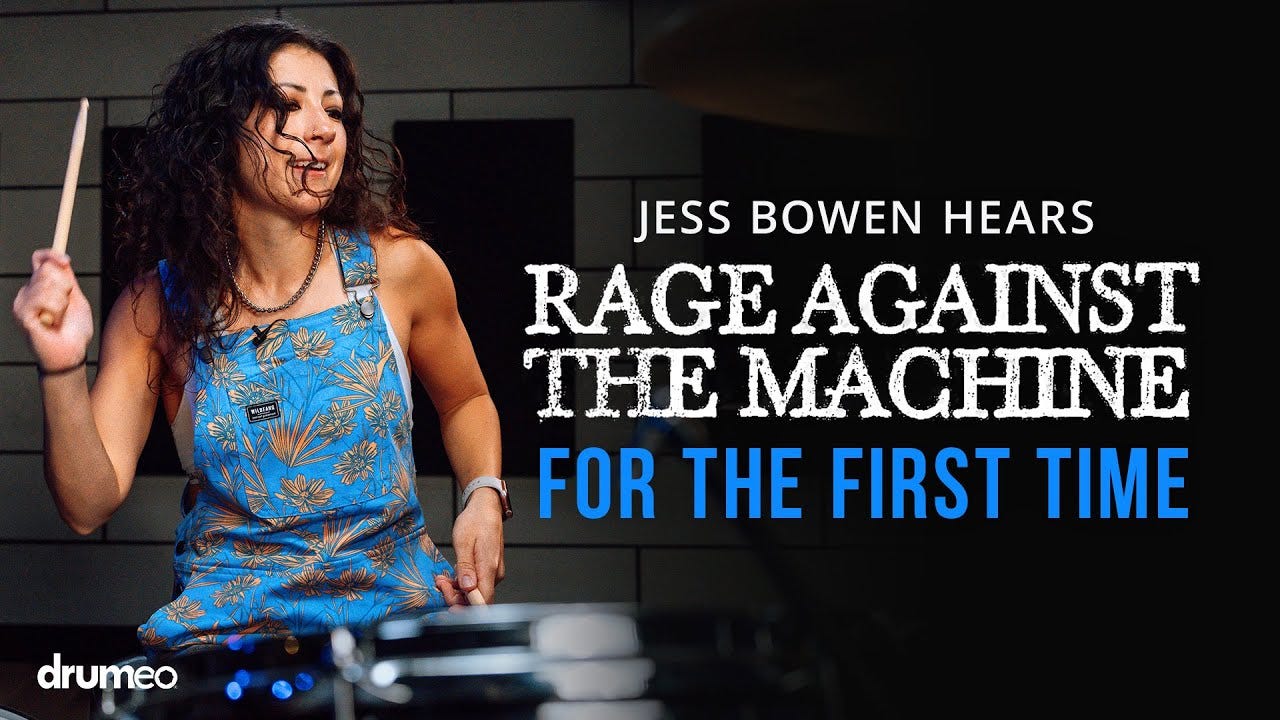Ryan Anderson | April 29, 2025
The Subtraction Edition
On the human need to do more, and maybe even too much.
Ryan Anderson (RJA) is a freelance marketing exec based in Atlanta, GA. He’s written WITIs about statistical paradoxes, craft sticks, and many more. He has strong thoughts about how to build systems that enable performance and growth.
Ryan here. In 2023, Colin wrote a WITI about Drumeo’s YouTube content, where a professional drummer is put behind a kit and asked to play the drums for a popular song they have never heard. Since that edition, Drumeo’s YouTube channel has been a regular source of distraction for me.
It’s hilarious to watch experts react when they get thrown songs like Tool - Schism or The Mars Volta - Inertiatic ESP. (Putting either of these in front of a drummer unfamiliar with them and asking them to play it after one listen is arguably a war crime). And it’s enthralling to watch them piece the puzzle together and create something beautiful.
My most recent dive down the Drumeo rabbit hole was watching Jess Bowen, drummer of pop punk band The Summer Set, play Rage Against the Machine - Bulls on Parade.
Why is this interesting?
Drumeo’s content thrives on putting supremely talented people in uncomfortable situations. But what made this one particularly enjoyable was Jess’s self-reflection at the end of it, and how it relates to a book I loved last year.
The rest of this WITI will go best if you watch the video. Take 15 minutes and enjoy the show.
—
Alright, now that you’ve watched the video and are in a much happier mood—Jess is fantastic!—let’s break it down a little.
Rage Against the Machine is pure adrenaline. They are a classic 4-piece band (singer, guitarist, bassist, drummer) who excel at energy and passion. You can see Jess really feels this immediately, and is beating the absolute hell out of the drums while playing to the song. So hard that she actually knocks one of the cymbals out of place at about the 5:30 mark, and Drumeo Brandon has to slip into the studio and reset it, which is a great touch.
But a staple of Rage songs is also the absence of instruments. There are lots of examples across their catalog where 1 or 2 instruments just drop out entirely, leaving lead singer Zach de la Rocha and a single band member (typically guitarist Tom Morello) to carry the entire song for 5-10 seconds at a time. The effect is a raw and powerful feeling that’s great for getting you through a workout or mile 15 of a long run.
If you are familiar with the song Bulls on Parade, then Jess’s version diverges from your expectations 4 minutes into the video, when she plays through what you are expecting to be the opening guitar solo. As she listens to the original version of the song towards the end of the video we get her honest thoughts:
JB: “Oh, it drops off! Okay. I made it harder on myself, I could’ve just not played anything!”
JB: “I really tried to overcomplicate all of this”
BT: “Most drummers who do this, there’s always some spots that have spaces like you were saying. Most of them want to play through it, but it’s hard to know when you don’t know the song.”
JB: “Right! I was like, wow, it would’ve been easy to just drop out in that spot. It makes sense too, because that was one of the parts, when I was listening through the first time, I was like ‘Oh, I wonder what I would do in this part.’ I should’ve felt that drums don’t feel like they would be in that part. But, you know, first time!”
When someone asks you to participate in a project, the human instinct is to want to do something. We don’t want to just stand around after getting asked to join. But sometimes doing less, or even removing things, is the best way to improve something.
Last year, I read the book Subtract by Leidy Klotz. Early in the book he recounts a number of studies where the participants were asked to improve or correct something (a recipe, a LEGO build, a grid of shaded squares) however they wanted. Across these studies, almost every participant ADDED to what they were given. Even when the team designed an experiment to give participants an obvious opportunity to subtract for improvement (an overloaded itinerary for a Washington DC vacation with 12 activities in a 14 hour period) nearly 75% of responses added things to the schedule.
My big takeaway from the book was how we as humans neglect subtraction as a way to change and improve things. And it was fun watching Jess come to that conclusion without having to read a 300 page book like I did.
There is another Drumeo video, referenced at the end of Jess’s video, that goes even further down this path: Nic Collins playing Whiplash. This song has even more and longer parts that are entirely drumless. After fighting with finding a way to fill the space, you can hear Nic’s amazement when he finally hears the original version.
NC: “There is a valuable lesson in there somewhere, and that’s sometimes drummers need to know when to shut up and not play and not overstep on everything else.”
And then he really sums up how we are all so bad at subtracting.
NC: “Can you imagine if I just sat here and didn’t play until like, you know, the song actually kicked it? I mean, you assume the way those horns come in something’s about to happen. But now in retrospect, me hitting the concert toms, when there should just be nothing there…[laughs].”
Can you imagine? (RJA)
